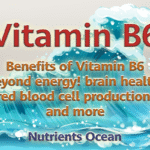Vitamin B12
Vitamin B12, also known as cobalamin, is a water-soluble vitamin that plays a crucial role in various physiological processes in the body. Despite being needed in relatively small amounts, vitamin B12 is essential for maintaining overall health and well-being. In this article, we’ll delve into the importance and health benefits of vitamin B12, discuss various food sources rich in vitamin B12, and explore signs, symptoms, and methods for determining its deficiency.
Importance of Vitamin B12
Vitamin B12 is involved in several key functions in the body, including:
1. Red Blood Cell Formation:
Vitamin B12 plays a crucial role in the synthesis of red blood cells, which are responsible for carrying oxygen to tissues and organs throughout the body. Adequate vitamin B12 levels are essential for preventing megaloblastic anaemia, a condition characterised by large, immature red blood cells.
2. Neurological Function:
Vitamin B12 is necessary for maintaining the health of the nervous system, including the production of myelin, a protective sheath that surrounds nerve fibers. Adequate vitamin B12 levels are vital for optimal nerve function and preventing neurological disorders such as peripheral neuropathy and dementia.
3. DNA Synthesis:
Vitamin B12 is involved in DNA synthesis and cell division, making it essential for growth, development, and repair of tissues throughout the body.
Health Benefits of Vitamin B12
1. Energy Production:
Vitamin B12 plays a crucial role in converting food into energy by aiding in the metabolism of carbohydrates, fats, and proteins. Adequate vitamin B12 levels can help maintain energy levels and combat fatigue.
2. Heart Health:
Vitamin B12, along with other B vitamins such as folate and vitamin B6, helps regulate homocysteine levels in the blood. Elevated homocysteine levels are associated with an increased risk of heart disease, and adequate vitamin B12 intake can help lower these levels and support cardiovascular health.
3. Cognitive Function:
Food Sources of Vitamin B12
Vitamin B12 is primarily found in animal-derived foods, making it essential for vegetarians and vegans to include fortified foods or supplements in their diets. Some of the best food sources of vitamin B12 include:
- Meat: Beef, lamb, and poultry
- Fish: Salmon, trout, tuna, and sardines
- Shellfish: Clams, oysters, mussels, and crab
- Dairy Products: Milk, cheese, yoghourt, and eggs
- Fortified Foods: Certain breakfast cereals, plant-based milk alternatives, and nutritional yeast products are fortified with vitamin B12.
Signs and Symptoms of Vitamin B12 Deficiency
Vitamin B12 deficiency can lead to a range of signs and symptoms, including:
- Fatigue and weakness
- Anaemia (megaloblastic or pernicious)
- Neurological symptoms such as numbness, tingling, and difficulty walking
- Cognitive impairment, memory loss, and dementia
- Mood changes, depression, and irritability
- Digestive issues such as diarrhoea or constipation
- Glossitis (inflammation of the tongue) and mouth ulcers
Ways to Determine Vitamin B12 Deficiency
Diagnosing vitamin B12 deficiency typically involves a combination of clinical evaluation, medical history, and laboratory testing. Healthcare providers may consider the following approaches:
1. Blood Tests:
Blood tests can measure levels of vitamin B12 in the blood, as well as other markers such as methylmalonic acid (MMA) and homocysteine levels, which can indicate vitamin B12 deficiency.
2. Physical Examination:
Healthcare providers may perform a physical examination to assess signs of vitamin B12 deficiency, such as pale skin, glossitis, or neurological symptoms.
3. Dietary Assessment:
Healthcare providers may inquire about dietary habits, especially for individuals following vegetarian or vegan diets, to assess potential risk factors for vitamin B12 deficiency.
4. Response to Treatment:
If healthcare providers suspect a vitamin B12 deficiency based on clinical evaluation and laboratory tests, they may recommend treatment with vitamin B12 supplements. Improvement in symptoms after supplementation can further support the diagnosis of vitamin B12 deficiency.
In conclusion, vitamin B12 is a vital nutrient that plays a crucial role in maintaining overall health and well-being. Including vitamin B12-rich foods in your diet and being aware of signs and symptoms of deficiency can help ensure optimal vitamin B12 status and support overall health. If you suspect you may have a vitamin B12 deficiency, it’s essential to consult with a healthcare professional for proper evaluation and management. They can perform the necessary tests to assess your vitamin B12 status and recommend appropriate interventions based on your individual needs.



